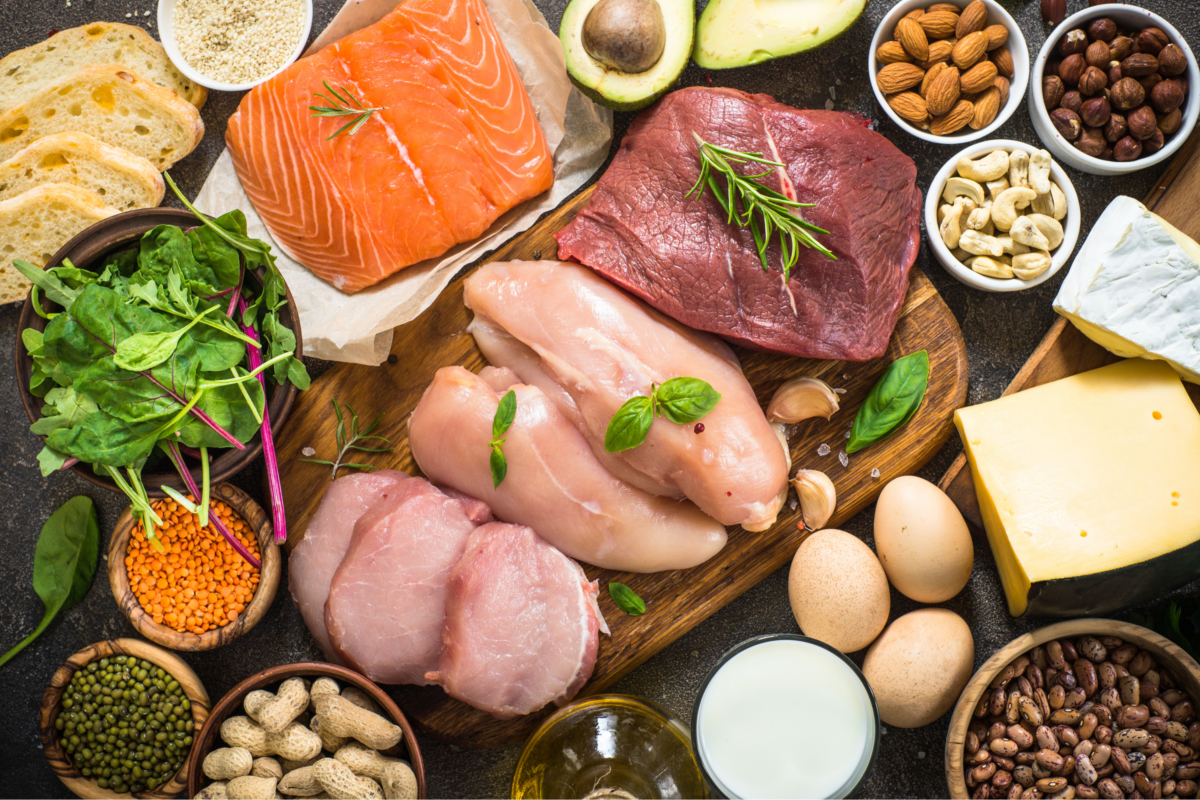By Emma Bardwell, Registered Nutritionist and Menopause Specialist.
The Power of Protein
I’m evangelical about protein and its wide-ranging health benefits. And yet I still see so many women who simply aren’t eating enough of it – particularly when it comes to menopause. Protein is a game changing tool to have in your nutrition toolkit. In fact, if there’s just one thing you do today to benefit how you feel tomorrow, I suggest increasing the amount of protein you consume.

5 Reasons Protein is so Important
Protein is essential for virtually every one of your cellular functions. Most people, when they think of protein, think of its role in building muscle. While this is true, there’s much more to protein than muscle.
- You need protein for the structure, metabolic function, and regulation of all your tissues and organs, not just muscle. Your bones, your ligaments, your tendons, your liver, your brain, skin, and fingernails are all built from protein.
- Every cell in your body contains enzymes, which are made of proteins, that determine how well your body functions, and, as a result, how well you feel.
- Protein is also important for neurotransmitters (eg. serotonin and dopamine) which are responsible for things like mood and sleep, as well as antibodies which are needed for robust immune health.
- Protein is critical for creating hormones such as insulin and thyroid hormones.
- And, yes, protein is key for helping prevent muscle loss. Muscle is the foundation of your metabolism, helping to regulate blood sugar and blood lipids. The stronger and healthier your muscles, the more carbohydrates and fat your body burns. In many ways, muscle is your metabolic superpower. Obesity, diabetes, heart disease and many other chronic health conditions often begin with inactive muscle and poor metabolism.
Fun Facts
- We need to make almost 300g of new proteins every day. This is true whether you’re 16 or 65.
- Every protein in the body has a ‘turnover’ rate and different proteins have different lifespans: proteins in the liver are replaced every hour, proteins in muscle are replaced every 6 weeks and connective tissue (in joints for example) is replaced every 6 months or so.
- Every 3 months or so you replace every protein in your body
The Benefits of Protein
- Helps mitigate weight gain
- Keeps you satiated (fills you up)
- Helps regulate blood sugar
- Helps regulates blood lipids (fats)
- Improves insulin sensitivity
- Increases energy levels
- Helps stop cravings
- Needed to make hormones (thyroid, insulin and others)
- Essential for building lean body mass and muscle
- Helps improve body composition
- Essential for immune health
- Protects our skeleton (bone density) and prevents injury
- Reduces risks of falls as we get older
- Aids in recovery and healing from illness and surgery
- Provides the building blocks for ‘feel-good’ neurotransmitters (serotonin, dopamine, adrenaline)

Protein & Perimenopause
During the perimenopausal years, oestrogen and progesterone – the hormones that regulate the menstrual cycle – begins to naturally decline. Women have hormone receptors all over their bodies, so they may feel the effects from their scalp, to their toes. Common symptoms include mood swings, hot flushes, night sweats, aching joints and insomnia. It’s the lesser-discussed symptoms though – especially the psychological ones, such as anxiety, brain fog and forgetfulness – that really need more airtime.
Switching up your diet at this stage in your life really can help:
- Ensure you eat a balanced, protein-rich breakfast
- Feed your gut with foods that are rich in good bacteria, such as fermented ingredients like kimchi and sauerkraut, and aim for around 30g of fibre a day, which is found in fruit and vegetables, brown rice, nuts, seeds and oats
- Increase your protein intake – perimenopausal women should be looking at around 1.2 to 1.6 grams of protein per kilogram of ideal body weight. Adding strength training exercises to your workouts helps build and maintain muscle too.
- Add colour to your plate with different coloured plants, which are linked to higher levels of phytonutrients and have a variety of antioxidants.
- Think about reducing your caffeine intake as caffeine can sometimes exacerbate symptoms of perimenopause such as anxiety and palpitations. My advice is to keep it to the mornings only.
5 Take-Home Messages
- Add to your diet, don’t take away. Menopause is not a time to be restricting and feeling deprived, even if you are noticing changes in body composition and want to do something about managing your weight. Think about generous, hearty meals that harness the power of protein but still taste really good: ingredients such as lentils, yoghurt, eggs, edamame beans, cheese, salmon and tofu.
- Whether you choose to eat breakfast at 7am or 11am, your first meal is, in many ways, the most important. Try to eat something protein rich to really set your energy and mood for the rest of the day. We know that higher protein foods fill you up and banish cravings by down regulating the hunger hormone, ghrelin. Protein can also help stabilise blood glucose levels, staving off the dreaded post lunch slump and hangry irritability that often show up when we don’t eat nutritionally balanced meals.
- Mix up your sources so you get plenty of variety. Most of us know about animal protein but plant protein has additional benefits such as phytoestrogens (shown to help some women manage symptoms such as hot flushes) and shouldn’t be forgotten. Try a soya-based yoghurt such as The Coconut Collab’s Protein Yog mixed with a tablespoon of chia seeds and a splash of soya milk, topped with berries and a drizzle of nut butter – delicious, fuss-free and ridiculously easy to throw together.
- Eating more protein can help your body recover more efficiently after exercise. Not only does it help strengthen bones, it also plays a role in keeping age related muscle loss (sarcopenia) at bay. But it isn’t just for fitness gains. Protein has benefits for everyone who wants to feel and live their best life. There are lots of confusing, not to mention conflicting, messages about how much protein you should be consuming. As a nice simple guide, think about a palm or first sized portion with every meal.
- The beauty of plant protein is that it goes beyond just protein! It contains fibre, vitamins, minerals and phytonutrients, plus is generally low in saturated fat and cholesterol. Think legumes (beans, peas, lentils), soya products (yoghurt, tofu, tempeh, edamame beans), grains (quinoa, freekeh) and nuts and seeds. Some plant proteins such as soya have been linked with lower levels of cardiovascular disease and may even protect against some forms of cancer, so it really is an ingredient worth watching.
About the expert
A nutritionist, health writer and author of The Perimenopause Solution, Emma Bardwell is hugely respected within the menopause space and blends nutritional science, diet therapy and behaviour change with understanding. She writes about all stages of menopause for a range of titles, including Stylist, Women’s Health, The Independent and The Guardian, with previous corporate clients including The Body Shop, Accenture, The Co-op, Macquarie Group, BUPA, Sweaty Betty, Hearst Magazines and Clarins. Find out more at emmabardwell.com and for more information about The Coconut Collab’s Protein Yog (available from Tesco and Ocado), please visit coconutco.co.uk


